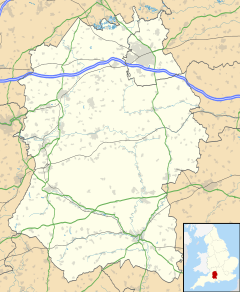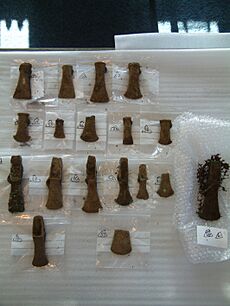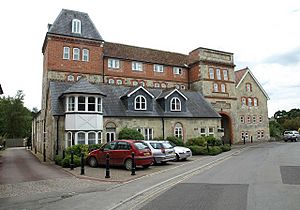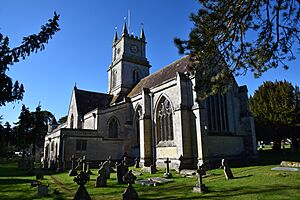Tisbury, Wiltshire facts for kids
Quick facts for kids Tisbury |
|
|---|---|
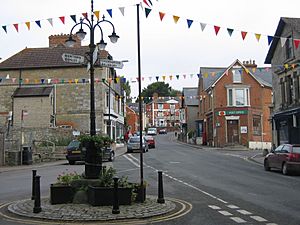 The Square and High Street |
|
| Population | 2,253 (in 2011) |
| OS grid reference | ST944295 |
| Unitary authority |
|
| Ceremonial county | |
| Region | |
| Country | England |
| Sovereign state | United Kingdom |
| Post town | Salisbury |
| Postcode district | SP3 |
| Dialling code | 01747 |
| Police | Wiltshire |
| Fire | Wiltshire |
| Ambulance | Great Western |
| EU Parliament | South West England |
| UK Parliament |
|
| Website | Parish Council |
Tisbury is a large village in Wiltshire, England. It is located about 13 kilometers (8 miles) west of the city of Salisbury. In 2011, the village had a population of 2,253 people. Tisbury acts as a central point for the smaller communities located around the upper River Nadder and the Vale of Wardour. The village parish also includes the small areas known as Upper Chicksgrove and Wardour.
Tisbury is the biggest settlement within the Cranborne Chase and West Wiltshire Downs Area of Outstanding Natural Beauty. Larger nearby towns like Salisbury and Shaftesbury are just outside this special natural area.
Contents
- Ancient Times: Prehistory of Tisbury
- Tisbury Through the Ages: A Village History
- Tisbury's 19th-Century Growth
- Places of Worship in Tisbury
- Education in Tisbury
- How Tisbury is Governed
- Famous People Connected to Tisbury
- Things to Do and See in Tisbury
- Getting Around: Transport in Tisbury
- Future Plans: Housing Development
- Tisbury on Screen: Film Locations
- See also
Ancient Times: Prehistory of Tisbury
The Tisbury area has some interesting finds from very old times.
Early Human Activity in the Area
Scientists have found signs of early human life here. For example, at Swanscombe in Kent, skull pieces of a young woman were found in a 400,000-year-old layer of gravel. Along with these remains were pieces of a special type of coral. This coral is only found in the Tisbury area. This suggests that these ancient people traveled to Tisbury or traded with groups who lived here. Some believe the coral was even carved to look like a human head. If true, this would make Tisbury the source of material for one of the world's oldest pieces of art!
Bronze Age Settlements and Discoveries
Just like in many parts of the Wiltshire Downs, there is also proof of people living here during the Bronze Age. In 2011, a collection of 114 bronze items, called the Tisbury Hoard, was found. These items date back to the 9th or 8th century BC.
Southeast of the village, there is a large hillfort known as Castle Ditches. This fort was mentioned in a document from 984 AD. Inside the fort's walls is a long barrow, which is an ancient burial mound. It is 60 meters long, 25 meters wide, and 0.7 meters high.
Lost Stone Circle of Tisbury
A stone circle used to stand in fields near the Chicksgrove and Chilmark roads. One of these fields was even called "Lost Stone Field." The last three standing stones were moved in the late 1700s. They are now part of a special garden feature at Old Wardour.
Tisbury Through the Ages: A Village History
Tisbury has a long and rich history, dating back over a thousand years.
Early Beginnings and Monastery Life
There are records from the early 700s mentioning Wintra, who was an Abbot (a leader of monks) in Tisbury. In 759, monks from Tisbury are mentioned again in a land grant. It is thought that a monastery might have been started here as early as 705. An old cemetery found north of Church Street might be where this monastery was located.
Saxon Times and Shaftesbury Abbey
During the Saxon period, the village came under the control of Shaftesbury Abbey. The Domesday Book of 1086, a famous survey of England, recorded Tisbury (then called Tisseberie) as a fairly large settlement with 90 households.
The abbey's main administration building was a monastic grange. The 14th-century building, now a house at Place Farm, is a very important historical building. Its outer and inner gatehouses, built in the 15th century from limestone, are also historically protected. The thatched tithe barn is also a protected building. Today, it is used as a gallery and arts center called Messums Wiltshire.
Growth and Challenges in the Middle Ages
Tisbury became prosperous in the 1200s. This was thanks to its quarries, which provided stone for building Salisbury Cathedral. The village also had a strong wool industry, supporting local cloth makers.
However, Tisbury faced a major challenge with the Black Death in the mid-1300s. The plague caused a serious decline in the population, but the village slowly recovered. Gaston Manor, near the High Street, is a former 14th-century large house. It was rebuilt and expanded in the 1500s and 1600s. Southwest of the village center are the remains of Wyck, a village that was abandoned in the 1300s.
In 1377, a tax called the poll tax was collected. This tax gives us an idea of the population. In Hatch (part of Tisbury), 152 people paid the tax. In Tisbury itself, 281 people paid. On a map of Wiltshire from 1611, the village's name was written as Tilburye. This was likely a mistake by the mapmaker.
Notable Nearby Castles and Estates
About 2 kilometers (1.2 miles) southwest of Tisbury is Wardour. The 14th-century Wardour Castle was badly damaged during the English Civil War in the 1640s. A new house, New Wardour Castle, was built in the 1770s in a grand style. This was the home of the Lords Arundell of Wardour for many years. Both the old castle ruins and the new house are important historical sites.
The Fonthill estate covers parts of several parishes, including Tisbury. This estate was once home to grand country houses like Fonthill Splendens and Fonthill Abbey. Most of the beautiful Fonthill Lake is within the Tisbury parish. The estate is currently owned by Alastair Morrison, the 3rd Baron Margadale. He owns land and property in Tisbury, including the area where the old abbey stood at Place Farm.
Tisbury's 19th-Century Growth
The 1800s brought many changes and developments to Tisbury.
Quarrying and Industry
Stone quarrying became more important from the mid-1700s. By 1846, there were 40 quarries in the parish. This industry was busiest in the late 1800s and early 1900s. However, none of the quarries went underground.
Arrival of the Railway
The Salisbury and Yeovil Railway opened Tisbury station on May 2, 1859. This was part of the first section of the line from Salisbury to Gillingham. Originally, the railway was planned to bypass Tisbury, but a Quaker activist named John Rutter pushed for the line to go through both Tisbury and Shaftesbury. At first, only passengers used the line. Goods traffic started on September 1, 1860, when the line was extended to Exeter. The London and South Western Railway ran the services. By 1870, the line had two tracks, though the part crossing Tisbury was reduced to a single track in 1967.
Local Businesses and Schools
From 1861, a glove factory operated in a building near St John the Baptist parish church. It employed 36 women and continued production until the early 1970s. In 1873, St. John's Infants' School was built on the High Street. Lord Arundell and others paid for its construction.
After a workhouse on Church Street closed in 1868, it was turned into a brewery. This brewery was later replaced by a steam brewery, which was rebuilt in 1885 after a fire. Archibald Beckett, who owned the brewery, also made other improvements, including building a new road through the village, which is today's High Street. From 1914, the brewery buildings housed a steam-powered flour mill, and later a mill for animal feed, which closed in 1964.
Places of Worship in Tisbury
Tisbury has several historic churches and chapels.
St John the Baptist Parish Church
The parish church of St John the Baptist is described as "the largest church in its part of Wiltshire." The church is made of limestone. The first mention of the church is from the early 1100s, and parts of its original stone can still be seen in the nave walls. The base of the central tower is from the late 1100s, and its first section is from the 1200s. The two-story north porch is also from the 1200s. In 1299, the north transept became the Lady Chapel. The chancel was rebuilt in the late 1200s or early 1300s. In 1450, the nave was rebuilt to be wider, with a row of windows above and a special wagon-shaped roof. You can still see the outline of the older roof on the tower's west wall.
The church's wooden benches, choir stalls, and pulpit were put in during the 1660s. The font, which might be from the 1200s, was also restored then. The decorative screen behind the altar, called a reredos, was added in 1884. The four bells were remade in 1700, and two more were added in 1720. All remain except one, which was recast in 1989. The tower once had a tall spire, but it fell in 1762. A shorter story was then added to the tower. The clock was made by a local clockmaker, Thomas Osmond. A church organ was installed in 1887 and restored in 2014. The church was listed as a Grade I historic building in 1966.
The largest yew tree in the churchyard is over 1,000 years old. Several old stone tombs are also protected historical structures. The parents of the famous writer Rudyard Kipling, John and Alice Kipling, are buried here.
Church Parish Area
Besides Tisbury, the church's parish used to cover part of Wardour and the area now known as West Tisbury. Since 1976, Tisbury church has been part of a group of churches called the Nadder Valley Team Ministry, which includes 15 churches.
St Andrew's church at Newtown (now in West Tisbury) was built in 1811. It used stone from an older church. It was a smaller church connected to Tisbury until 1975 and is now a home.
Other Religious Buildings
Zion Hill, a Congregational chapel, opened in 1842. It stopped being used as a church after 1977 and is now homes. It is also a protected historic building.
The Roman Catholic Church of The Sacred Heart was built on the lower High Street in 1898. The Arundell family of Wardour helped fund it. The Arundells had a large private chapel at New Wardour Castle, built in the 1770s. This chapel is now owned by the Wardour Chapel Trust.
A Methodist chapel was built on the High Street in 1902.
Education in Tisbury
Tisbury has a history of providing education for its young people.
A National School was built near the church in 1843. It replaced earlier informal schools. A separate infants' school was built in 1873. By 1905, the school for older children could hold 290 students.
Children of all ages were taught here until 1961. That's when Dunworth Secondary Modern School was built for students over 11. The old 19th-century school building was used until a new primary school opened in 1973, next to the secondary school. The old school building then became the village hall.
In 1983, a new school system was introduced. Dunworth School became the Nadder Church of England Middle School. Students over 13 then traveled to Shaftesbury for their education. In 2004, the school system changed back. The middle school closed, and its site was later used to build the Nadder Centre. The 1973 school is still open today as St John's CofE Primary School.
How Tisbury is Governed
Tisbury has its own local government.
The village elects a parish council to manage local matters. It is also part of Wiltshire Council, which is a larger local authority responsible for most important local government services.
Historically, the Tisbury parish was very large. For centuries, it was divided into four areas: Tisbury, Staple, Chicksgrove, and Hatch. In 1835, it was split into three separate parishes: East Tisbury, West Tisbury, and Wardour. In 1927, East Tisbury and Wardour were joined together to form the current Tisbury civil parish.
Famous People Connected to Tisbury
Many interesting people have lived in or had connections to Tisbury.
Thomas Mayhew (1593–1682), who started the first English settlement on Martha's Vineyard in North America in 1642, was born in Tisbury. Other people born here include the preacher Rev. William Jay (1769–1853), the nuclear engineer Christopher Hinton (1901–1983), and actress Gillian Lewis. Etheldred Benett (1776–1845), an early geologist, was also born in Tisbury and studied fossils in the area.
Sir Matthew Arundell of Wardour Castle, a wealthy landowner and cousin of Queen Elizabeth I, was buried in the parish church in 1598.
The Tisbury stonemasons Joseph and Josiah Lane, a father and son, built many decorative grottos in England during the 1700s.
The parents of the famous poet Rudyard Kipling, Alice Kipling and John Lockwood Kipling, lived in Tisbury later in their lives. They lived in a house they called 'The Gables'. Their famous son visited them here. While working on his novel Kim, his father, who was an illustrator, used drawings of a student from Tisbury Boys' School as a model for the main character.
Other notable residents of Tisbury have included architect Edward Doran Webb, politician Henry Clark, army officer Major Derek Cooper, and businessman John Meade, 7th Earl of Clanwilliam. Humorous painter Charles "Snaffles" Payne lived and worked in Tisbury from the late 1940s. The artist and children's book author John Strickland Goodall lived here in 1946.
Diplomat Sir Horace Rumbold lived in Tisbury later in life. Charles McLelland, who was in charge of BBC Radio 1 and BBC Radio 2 in the 1970s, also lived here. Martin Fleischmann, a chemist known for his work in electrochemistry, moved to Tisbury after he retired. Robert Willis, who later became the Dean of Canterbury, was a rector in Tisbury from 1978 to 1987.
Things to Do and See in Tisbury
Tisbury offers various facilities and activities for its residents and visitors.
Community and Leisure Facilities
In August 2016, Wiltshire Council opened the Nadder Centre. This center provides leisure activities and is home to the local library. Since April 2017, after the local police station closed, the Nadder Centre also offers basic facilities for police officers working in the area.
Next to the Nadder Centre, there is an outdoor heated swimming pool. It is the only one of its kind in Wiltshire. The village has an amateur drama group called the Tisbury Arts Group. This group also hosts regular music events.
Annual Events and Local Recognition
Tisbury holds an annual carnival, usually in September. In 2019, it celebrated its 100th year! However, the event was canceled in 2020 and 2021 due to COVID-19 restrictions. There is also a biannual "Brocante," which is a festival of antiques and vintage finds.
The village has a small fire station, run by Dorset & Wiltshire Fire and Rescue Service. It has one fire engine and a Land Rover, staffed by part-time firefighters. In 2017, Tisbury was named one of the 'Best Places to Live' by the Sunday Times newspaper.
Lady Down Quarry, in the northeast of the parish, is a special geological Site of Special Scientific Interest.
Getting Around: Transport in Tisbury
Tisbury is well-connected by road and rail.
Tisbury railway station is on the West of England Main Line. This means residents can easily travel to London for work or visits. The village is about 2.5 kilometers (1.5 miles) from the A303 main road. This road links Andover with the West Country.
Salisbury Reds operates bus services from Tisbury. As of 2019, there are three buses a day from Tisbury to Salisbury and two in the other direction. Buses on the Shaftesbury to Salisbury route also stop in Tisbury. The village is also served by TISBUS. This is a community transport group that provides weekly shopping trips to Salisbury, Gillingham, Warminster, and Shaftesbury.
Future Plans: Housing Development
In 2021, a group called Tisbury Community Homes proposed plans for a development called Station Works. This plan included 86 homes and a care home with up to 40 beds. It would be built on an industrial site next to the railway line. This development would increase the village's population by 12%. Some businesses on the site would have to close, leading to about 50 job losses.
The Environment Agency objected to the plan because of a possible increased risk of flooding. Tisbury Parish Council also voted against the plan in December 2021. The local planning committee then refused the application. In March 2023, Tisbury residents raised over £15,000 to help with legal costs to challenge the development. In June 2023, the Planning Inspectorate officially rejected the developer's appeal against the refusal.
Tisbury on Screen: Film Locations
Tisbury and its surroundings have been used as filming locations for movies.
Scenes for the fictional Locksley Castle in the 1991 film Robin Hood: Prince of Thieves were shot at Old Wardour Castle. Fonthill Lake was used for riverside scenes in the 2000 film Chocolat, which starred Juliette Binoche and Johnny Depp.
Some scenes in the 2009 film Morris: A Life with Bells On were filmed in Tisbury. This included scenes at the Tisbury Sports Centre. Other scenes were filmed at the Compasses Inn nearby in Lower Chicksgrove.
See also
 In Spanish: Tisbury (Wiltshire) para niños
In Spanish: Tisbury (Wiltshire) para niños


